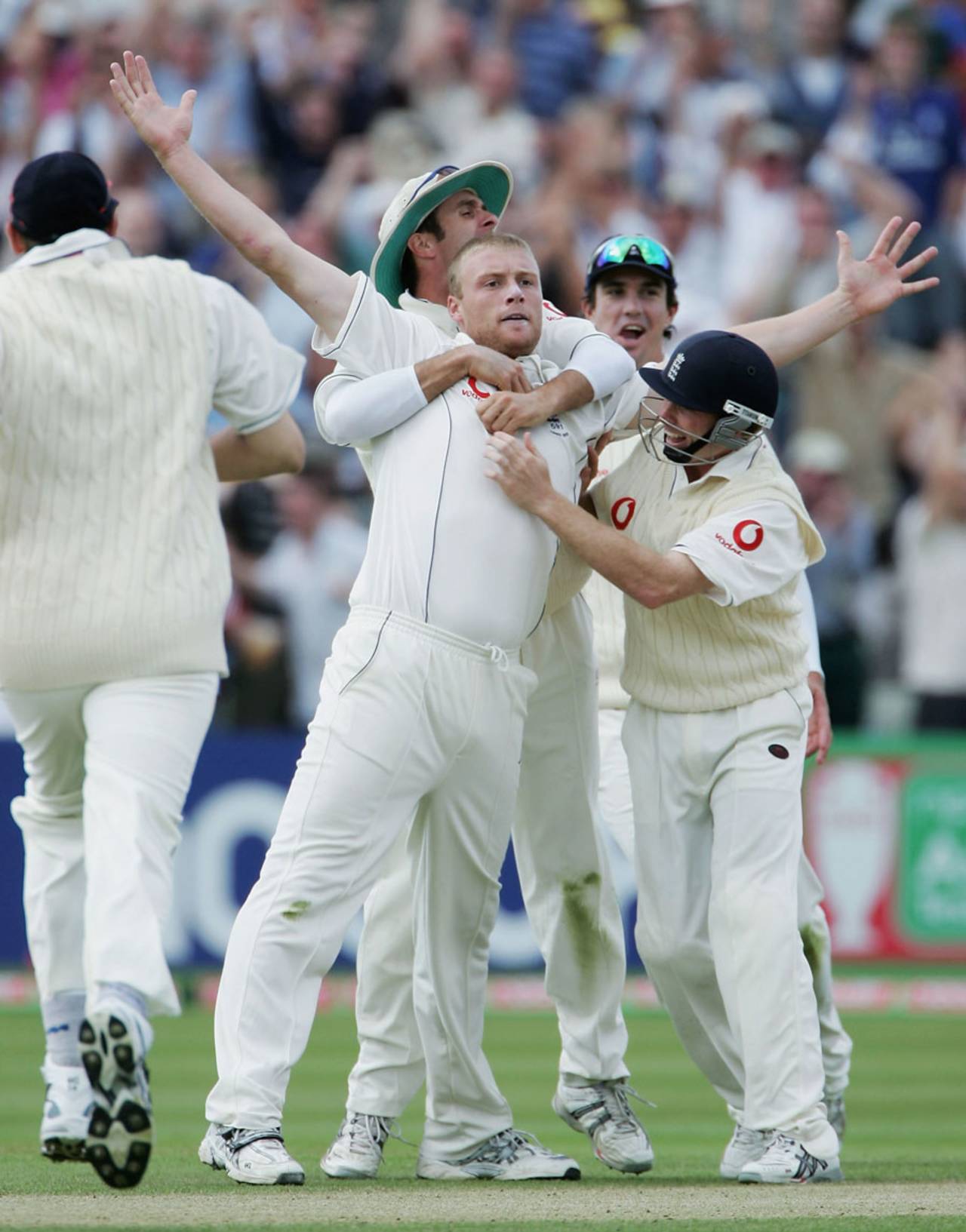A giant on his knees
Why does it matter what Andrew Flintoff does with his life after cricket? I suppose it is because each time you see something great in decline it cuts away at the sense of marvel and worship that filled you as a youth
Safi Thind
09-Mar-2013

England's "tubby blonde Alexander" in his pomp, at Edgbaston in 2005 • Getty Images
"What an immature, self-destructive, antiquated mischief is man!" said Evelyn Waugh when describing Andrew Flintoff. And how right he was.
The year is 2012. The slightly scraggly looking husk of a fat blonde man stands in a boxing ring wearing union jack pants with a mystified air. He doesn't look like he believes he doesn't belong here. His eyes, at least, look alive. But behind the eyes there is an air of solitude. The air of someone repeating to themselves a self-convincing mantra, in the words of Rocky Balboa - "I ain't no bum, Mick, I ain't no bum."
I don't know whether he wins or not. But I think I have seen this person before.
The year is 2005. A well proportioned, slightly beefy, blonde chap with a dark spot in his hair bowls six balls of unparalleled ferocity, which will soon become noted as amongst the greatest in Ashes history. This tubby blonde Alexander - looking like the English village churl - gives his heart and soul to destroy the old enemy and then, when they are lying in tatters at his feet, in a fit of divine sportsmanship, goes down to console his distraught opponent. Such acts of sporting greatness do not come very often.
Andrew "Freddie" Flintoff's career resembles the arc of Icarus tracing an excruciating fall, from England cricket darling to media whore in quicker time than he felled Justin Langer and Ricky Ponting on that day at Edgbaston. The question is why? Why the gameshow panel? Why the extreme sports? Why the darts commentary? Morrison's supermarket adverts - why? The drunken Atherton rant - well maybe....
Time and again the sporting world throws off its damaged goods, felled sportsmen, once-great fighters reduced to the status of bums. It isn't surprising of course. Put yourself in their shoes.
"Each time you see something great in decline it cuts away at the sense of marvel and worship that filled you as a youth, the shine that made you run to the television or radio and laud your heroes"
How do you recapture that split second of intense greatness that normal men dream about? It must seem a dank and grey world after you lose it - one where, as Michael Vaughan recently noted, you're no longer clapped into work. One where you no longer make drunken appearances at 10 Downing Street. Where if you capsize a pedalo in the sea - NO ONE CARES! In the most poignant piece of work Flintoff's done post-playing career, a TV programme on depression, he looked at some of these issues and came away as bewildered as ever.
I suppose it comes down to three things: life, purpose and meaning. We all need something to cling on to. Flintoff was hard done by in being wrenched from his career by injury when he still (in his mind) had so much more to give. Perhaps that he never had the long wind-down into cricket's dustbin suffered by many great pros (like Sachin Tendulkar clinging on to the frayed rope of past greatnesses) irks him.
And why does it matter anyway what he does with his post-sport life? He may be fine and dandy. Maybe such inane pokings are like those of the journalist who asked the famous "Where did it all go wrong George?" question, as George Best was reclining on a bed with £20,000 and a Miss World in his arms.
Well, I suppose it matters because each time you see something great in decline (Sachin again) it cuts away at the sense of marvel and worship that filled you as a youth, the shine that made you run to the television (or radio) and laud your heroes with the still untainted eyes (or ears) of disappointment.
In that sense it's a hard thing to see Flintoff flounder. But perhaps Flintoff's decline isn't his own problem. It's the demise in our eyes of a legend that we, the cricket fan, has created. Perhaps it's time we let go, not him.
A quite passionate follower of cricket and writer of articles, Safi Thind is one of the authors of the cricketerdiaries blog